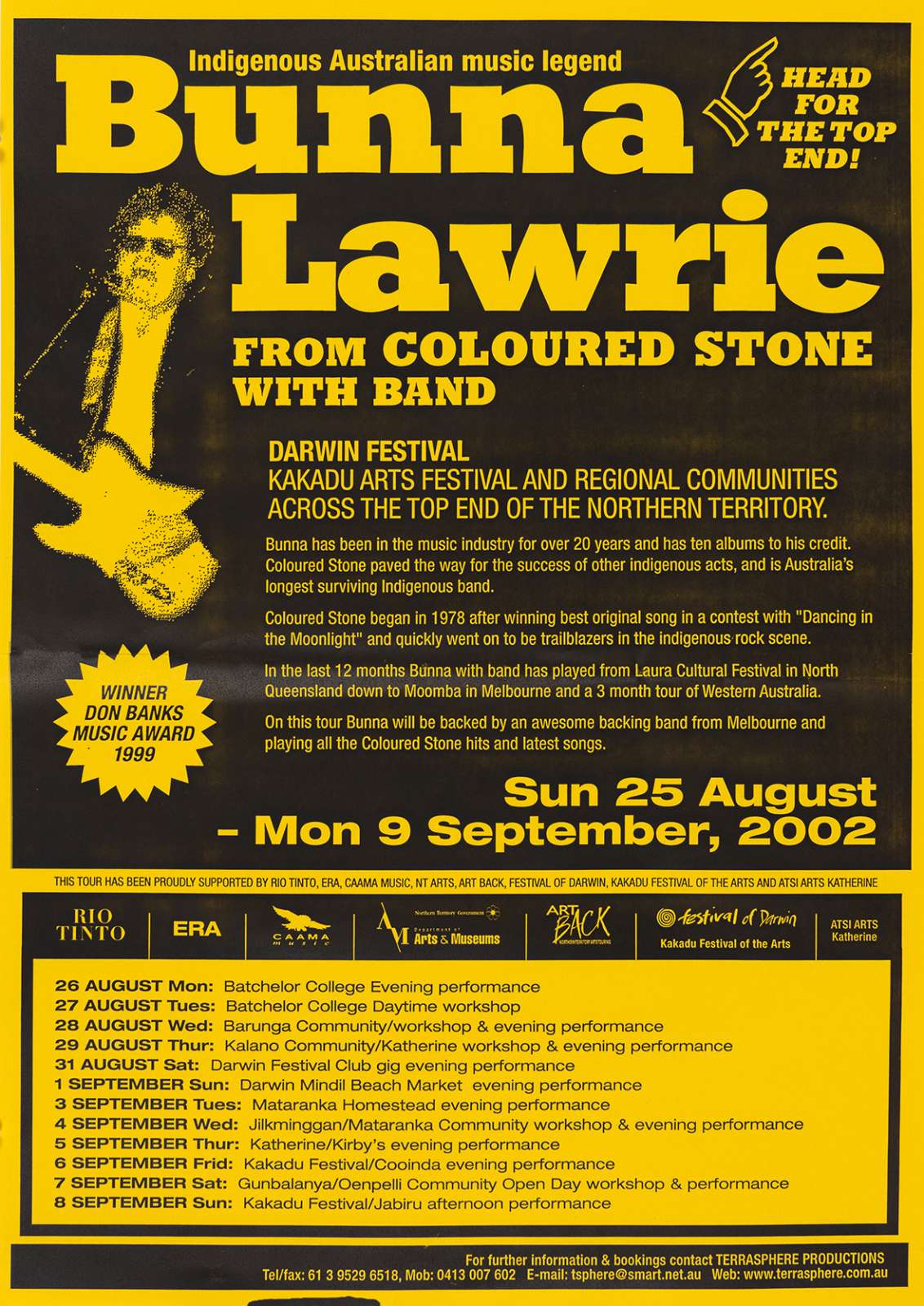Bunna Lawrie

Toured
2002
Locations
Northern Territory: Barunga, Batchelor, Cooinda, Darwin, Gunbalanya (Oenpelli), Jilmingan, Kalano, Katherine, Mataranka
About the poster
Aboriginal and Torres Strait Islander viewers are warned that photographs and video footage contain images of deceased persons.
Bunna Lawrie is a Mirning Senior Elder and Whale Songman of the Yinyila Nation. Mirning land is the arching bridge of the Ngargaum, Bunda Cliffs that holds up Australia. The lands include Ngargangooridri, the Nullarbor Plain and the seas of the Great Australian Bight. This is the place of the great white Dreamtime whale Jeedara.
Raised on Koonibba Mission, near Ceduna in South Australia, Bunna formed the band Coloured Stone in 1977. The original band members were three brothers, Bunna Lawrie (drums & lead vocals), Neil Coaby (rhythm guitar & backing vocals) and Mackie Coaby (bass & backing vocals) and their nephew, Bruce (Bunny) Mundy (lead guitar & backing vocals).
A prolific songwriter, Bunna’s work with Coloured Stone combined rock, ska and reggae. The result was a unique Aboriginal sound that also incorporated traditional instruments such as clap sticks, didgeridoo, bundawuthada (gong stone) and traditional language.
It was Bunna’s drive for the protection of the environment and his sacred totem, the Southern Right Whale, that became the subject of the inspiring film in 2008 produced by Julian Lennon, ‘The Whaledreamers’ which was the winner of 8 documentary awards. Later, Bunna was invited by Julian Lennon to sing on his album and he remains in contact with Julian, Yoko Ono and the White Feather Foundation.
I’m pretty much suffering for land, trying to teach people how to respect the Earth. I was born to do that [and] I love doing it because it’s about educating people about life – living with nature and doing the right thing with nature. One day they’re going to wake up and say, ‘These activists aren’t bad after all because look what happened; all the forests disappeared, all the whales are dead, the water’s poisoned, we can’t drink water. Now, we can’t eat money.’
Bunna Lawrie, ‘Bunna Lawrie on celebrating 40 years of Coloured Stone’, Beat
The relationship with Julian and Yoko seems preordained. When growing up Bunna was influenced by the music of The Beatles and he wanted to play the drums and sing like Ringo Star.
As a kid, I would sit down with a couple of boxes and mum would growl at me and kick me out of the house. ‘Stop putting dents in my saucepans and fine things! Get out of the house!’ I was ‘bang bang bang’ in the house.
Bunna Lawrie and Coloured Stone have played to national and international audiences and over the years won countless awards for their songwriting and music. In 1984 their single ‘Black Boy’ knocked Michael Jackson off the number one spot in New Caledonia.
‘Black Boy’ was born out of racism when the children of Koonibba had to catch a bus to go 25 miles to attend high school in Ceduna.
Because we were fast runners and better than them in football, they got jealous, and they were calling us b****s and blacks and black boy and n*****s. There was some good boys and girls in there, and there was some bad ones. The bad ones really, really hurt us.
At school, there was a poetry writing contest. Bunna wrote a poem but was too embarrassed to show the teacher as he thought he would receive a ruler across the knuckles.
Black boy, black boy, the colour of your skin is your pride and joy
Black boy, black boy, your life is not destroyed
Later when Coloured Stone was playing in a Port Augusta pub they performed ‘Black Boy’.
Everybody drinking in the bar turned around and asked, ‘Who wrote that song? Made my hair stand up man, it’s amazing … that song’s gonna be a hit’.
‘Black Boy’ has changed the lives of people across generations and has a powerful message. The film clip for ‘Black Boy’ was made in Alice Springs in 1983.
We read about this young fella named Brendan Nanjiani from up north: the Warumungu tribe.
He was only nine years of age and was sad. His father died from suicide because of the way he’d been treated with racism. ‘Black Boy’ – the song and story – fitted his life.
Now he’s a 40-something-year-old man, and when we play at Tennant Creek he’s come up to us. He started a band, and he’s driving a bus, picking up elders and taking them out bush: tucker hunting and gathering food.
Read the full ABC article ‘Coloured Stone’s ‘Black Boy’ continues to offer hope, almost four decades on’ by Karen Leng, Double J and Bunna Lawrie
Bunna Lawrie has toured to some of the remotest parts of Australia. Touring the Northern Territory in 2002, he inspired and gave hope to the next generation, to be proud of their skin and culture. Bunna and his band performed and delivered workshops to 2,645 people.
Mirning means ‘listen, learn and understand’.
All you’ve got to do now is to stand together and come and dance and sing with us. Come and walk with us now, walk with our spirits and ancestors. We can heal the past.
Bunna Lawrie